POLYCYSTIC OVARY SYNDROME (PCOS): SYMPTOMS, CAUSES, AND TREATMENT
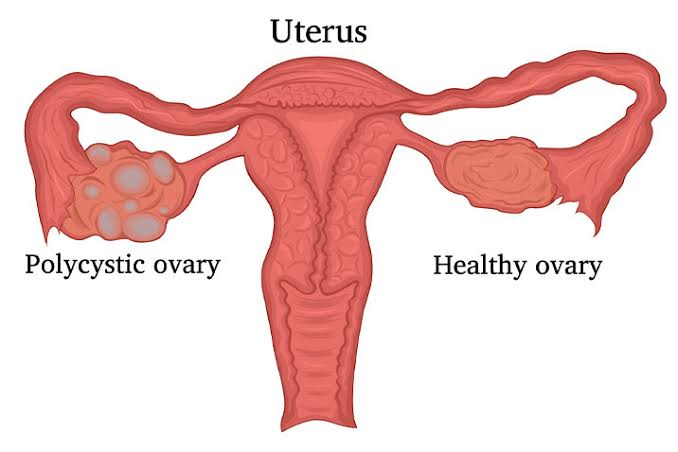
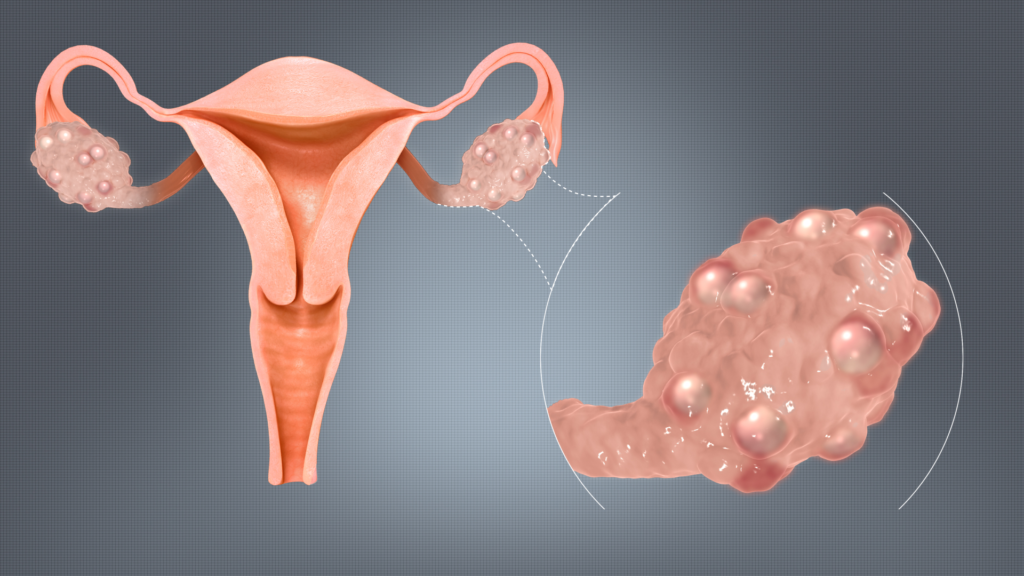
What are the treatment options for Polycystic Ovary Syndrome (PCOS)?
Do you experience irregular periods, excess hair growth, or trouble getting pregnant?
POLYCYSTIC OVARY SYNDROME (PCOS): a hormonal condition that affects women during their childbearing age
PCOS affects a woman’s ovaries (the reproductive organs that produce estrogen and progesterone — hormones that regulate the menstrual cycle). The ovaries also have a small number of male hormones called androgens.
The ovaries release eggs to be fertilized by a man’s sperm. The release of an egg each month is called ovulation.
Follicle-stimulating hormone (FSH) and luteinizing hormone (LH), produced in the pituitary gland, control ovulation.
FSH stimulates the ovary to produce a follicle — a sac that contains an egg — and then LH triggers the ovary to release a mature egg.
Women with PCOS produce higher-than-normal amounts of the male hormone (androgen). This hormone imbalance causes their body to skip menstrual periods, making it harder for them to get pregnant.
Its three main features are:
- Cysts in the ovaries: Many tiny, fluid-filled sacs grow inside the ovaries. The word “polycystic” means “many cysts(sacs)”. These sacs are follicles, each one containing an immature egg. The eggs never mature enough to trigger ovulation.
- High levels of male hormones (androgen): women with insulin resistance have low insulin sensitivity. Insulin is a hormone the pancreas produces to help the body use sugar from foods for energy. When cells can’t use insulin properly, the body’s demand for insulin increases. The pancreas makes more insulin to compensate. This condition — called insulin resistance — can cause insulin and glucose — to build up in the bloodstream. High insulin levels increase the production of male hormones called androgens. High androgen levels lead to symptoms such as body/facial hair growth, acne, irregular periods — and weight gain. Because male hormones trigger weight gain, it is typically in the abdomen. That is where men tend to carry weight. Abdominal fat is the most dangerous kind of fat. That’s because it is associated with an increased risk of heart disease and other health conditions.
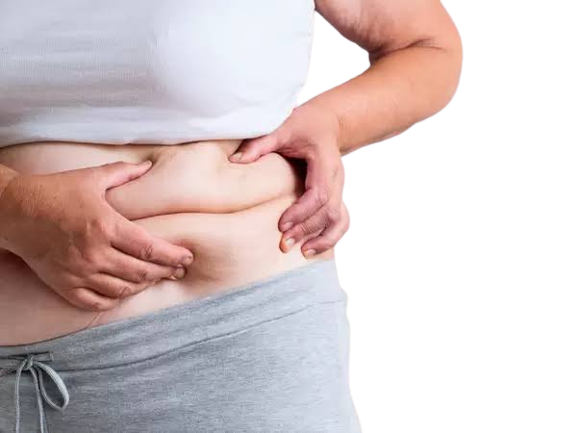
- Irregular or skipped periods: The lack of ovulation alters levels of estrogen, progesterone, FSH, and LH. Progesterone levels are lower than usual, while androgen levels are higher. Extra male hormones disrupt the menstrual cycle, so women with PCOS get fewer periods than usual.
CAUSES:
- Genes: Studies show that PCOS runs in families. It’s likely that many genes — not just one — contribute to the condition
- Insulin resistance
- Obesity is a significant cause of insulin resistance. Both obesity and insulin resistance can increase the risk of type 2 diabetes
COMMON SYMPTOMS OF PCOS:
Some women start seeing symptoms around the time of their first period. Others only discover they have PCOS after they’ve gained much weight or they’ve had trouble getting pregnant.
The most common PCOS symptoms are:
Irregular or skipped periods: A lack of ovulation prevents the uterine lining from shedding every month. Some women with PCOS get fewer than eight periods a year or none.
Heavy bleeding: The uterine lining builds up for a more extended period, so the periods can be more severe than usual when it occurs
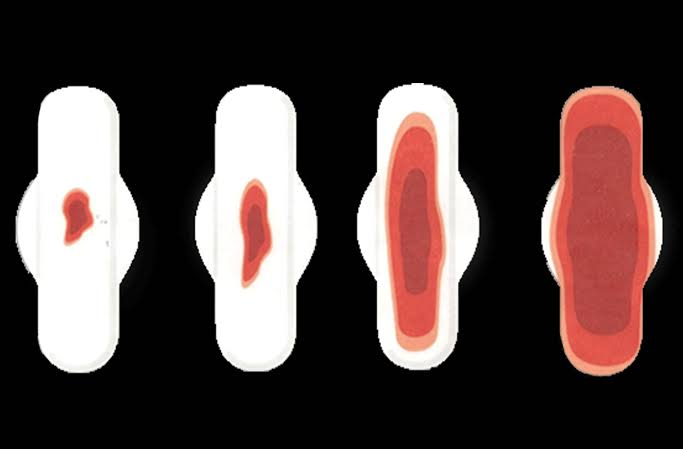
Hair growth: More than 70 per cent of women with this condition grow hair on their face and body, including their back, belly, and chest. Excess hair growth is called hirsutism.

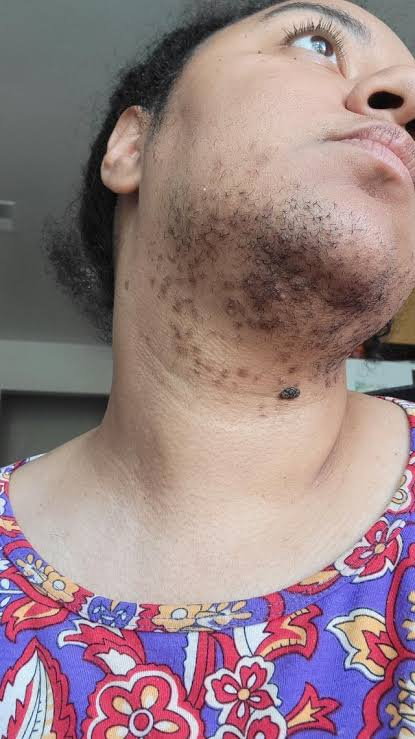
Acne: Hyperandrogenism (Excess androgen) cause the glands in the skin to produce an excess of an oily substance called sebum. Acne occurs when sebum and dead skin cells build up inside hair follicles, trapping bacteria beneath the skin. This leads to inflammation and the formation of pimples.
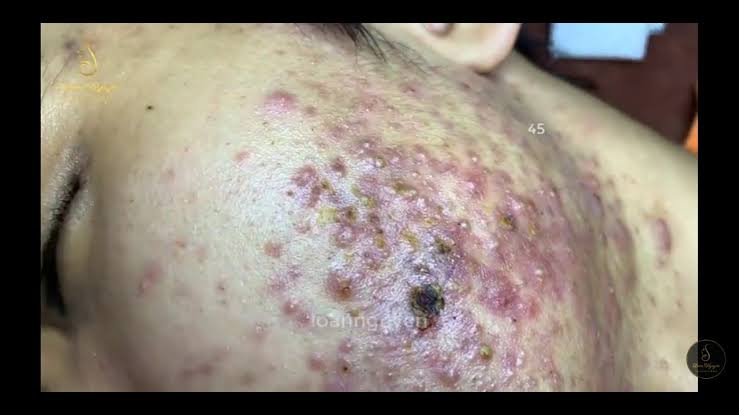
Weight gain: Up to 80 per cent of women with PCOS are overweight or have obesity
Male pattern baldness: Hair on the scalp gets thinner and may fall out.
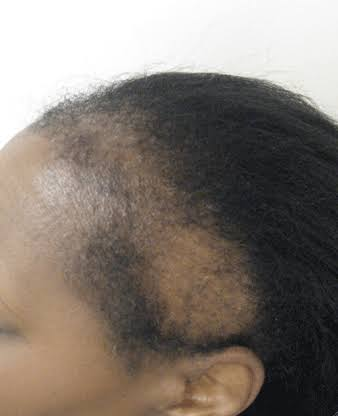
Darkening of the skin: Dark patches of skin can form in body creases like those on the neck, in the groin, and under the breasts.
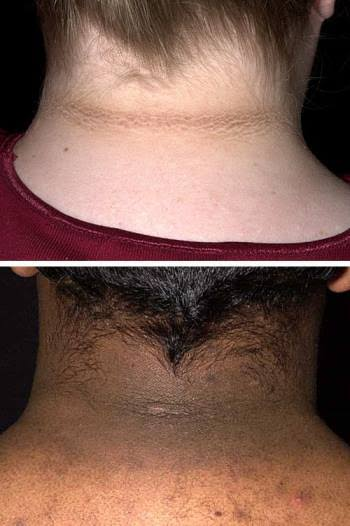
Headaches: Hormone changes can trigger headaches in some women
COMPLICATIONS:
Infertility:
High levels of androgens interfere with the development of eggs and the regular release of eggs.
If a healthy egg isn’t released, it can’t be fertilized by sperm, meaning pregnancy can’t occur.
Metabolic syndrome:
Up to 80 per cent of women with PCOS are overweight or have obesity. Both obesity and PCOS increase the risk for:
- high blood sugar
- high blood pressure
- low HDL “good” cholesterol
- high LDL “bad” cholesterol
These factors are called metabolic syndrome, increasing the risk for heart disease, diabetes and stroke.
Endometrial cancer:
During menstruation, the uterine lining sheds. In the absence of menstruation, the lining can build up. A thickened uterine lining can increase the risk of endometrial cancer.
DIAGNOSIS:
PCOS is diagnosed in women who have at least two of these three symptoms;
- High androgen levels
- Irregular menstrual cycles
- Cysts in the ovaries
Symptoms such as acne, weight gain, and face and body hair growth should also be considered.
A pelvic exam can be done to check for problems with the ovaries or other parts of the reproductive tract.
Hormone assay to check for hormonal imbalance
Blood tests check for cholesterol, insulin, and triglyceride levels to evaluate the risk for related conditions like heart disease and diabetes.
Pelvic scan: To check for the development of cysts
MANAGEMENT:
Lifestyle modifications are the first treatments recommended for PCOS, and they often work well.
Losing weight and lowering blood sugar levels can help regulate the menstrual cycle and improve the chances of having a healthy pregnancy.
Diet and exercise are two effective ways to lose weight.
Weight loss can also:
- improve cholesterol levels
- lower insulin
- reduce heart disease and diabetic risks

- Eat a high-fiber, low-sugar diet. Load up on fruits, vegetables, and whole grains. Avoid processed and fatty foods to keep blood sugar levels in check.
- Eat four to six small meals throughout the day rather than three large meals. This will help control your blood sugar levels.
- Exercise for at least 30 minutes a day on most, if not all, days of the week.
Supplements:
- Chia seeds help with lowering androgens
- Green teas improve weight loss
- Almonds improve blood sugar
- Multivitamins improve irregular periods
- Zinc and Saw palmetto improve facial hair
- Protein improves metabolism
- Inositol improves insulin resistance
Treatments include birth control pills to regularize periods and protect against endometrial cancer, metformin to prevent diabetes, statins such as rosuvastatin to control high cholesterol, hormones to increase fertility and procedures to remove excess hair.
Birth control pills that contain synthetic versions of the hormones estrogen and progestin may be prescribed. These pills can help regulate the menstrual cycle.
A progestin-only tablet may be recommended for women who cannot tolerate a combination birth control pill.
Medicines to induce ovulation:
Pregnancy won’t occur while a woman takes birth control pills for PCOS. But if pregnancy is desired, certain medications may help to induce ovulation;
Clomiphene
If clomiphene doesn’t help with ovulation, metformin may be prescribed to help the body use insulin more efficiently.
If clomiphene and metformin don’t work, a medication containing a follicle-stimulating hormone (FSH) and luteinizing hormone (LH) may be prescribed.
One other drug that helps with ovulation is letrozole. It’s sometimes used when other medications aren’t effective.
Sometimes medicines called anti-androgens may also be prescribed, e.g. spironolactone.
For hair loss from the head, a minoxidil cream may be recommended for use on the scalp.
Hair removal medications
A few treatments can help remove unwanted hair or stop it from growing.
Eflornithine (Vaniqua) cream is a prescription drug that slows hair growth. Laser hair removal can eliminate unwanted hair on the face and body.

Surgery
Surgery can be an option to improve fertility if other treatments don’t work.
Don’t ignore the symptoms of PCOS. If you think you may have PCOS, speak with your healthcare provider to discuss potential treatment options and ways to manage symptoms. Early diagnosis and treatment can help improve your health and quality of life.
Click here to book a free 15-minute consultation today.
REFERENCES:
Hormone Health Network: “Polycystic Ovary Syndrome.”
https://www.healthline.com/health/polycystic-ovary-disease#causes
Women’s Health Resource Center: “Androgens.”
https://www.medicalnewstoday.com/articles/pcos-acne#pcos-and-acne
U.S. Office on Women’s Health: Polycystic Ovary Syndrome.”
https://www.webmd.com/women/polycystic-ovary-syndrome-pcos-and-weight-gain
